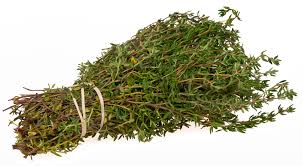Thyme leaf is a timeless herb revered for its distinct aroma, culinary uses, and medicinal properties. Originating from the Mediterranean region, thyme has been a staple in traditional medicine, cooking, and aromatherapy for centuries. Its small, green leaves pack a robust flavor with earthy, minty, and slightly lemony notes, making it a favorite in kitchens worldwide.
Known botanically as Thymus vulgaris, thyme is a perennial herb from the mint family, Lamiaceae. It thrives in dry, sunny climates and is often grown in home gardens for its culinary and therapeutic value.
Page Contents
ToggleNutritional Composition of Thyme Leaf

Thyme leaf is not only a flavorful herb but also a nutritional powerhouse. Its composition includes:
- Vitamins: Rich in vitamin C for immune support and vitamin A for vision and skin health.
- Minerals: Contains iron, calcium, and manganese, which are essential for bone strength and overall health.
- Antioxidants: Abundant in flavonoids and thymol, which combat oxidative stress and protect the body.
- Essential Oils: Contains thymol and carvacrol, compounds with potent antimicrobial and anti-inflammatory properties.
Health Benefits of Thyme Leaf
- Boosts Immunity
The high concentration of vitamin C in thyme leaves helps strengthen the immune system. Additionally, its essential oils possess antibacterial and antiviral properties that aid in fighting infections. - Supports Respiratory Health
Thyme is widely recognized for its ability to alleviate respiratory issues. It acts as a natural expectorant, helping to clear mucus and ease symptoms of coughs, bronchitis, and sinusitis. Drinking thyme tea or inhaling thyme-infused steam can provide significant relief. - Improves Digestive Function
Thyme stimulates the production of digestive enzymes, promoting better digestion and nutrient absorption. It also helps reduce bloating, cramps, and other digestive discomforts. - Enhances Heart Health
Thyme’s antioxidant content and anti-inflammatory properties contribute to improved heart health. It helps lower blood pressure, reduce cholesterol levels, and prevent arterial damage. - Promotes Skin Health
Thyme leaf’s antimicrobial properties make it effective in treating skin conditions like acne, eczema, and fungal infections. It soothes irritated skin and helps prevent bacterial infections. - Provides Antioxidant Support
Thyme is rich in antioxidants, which protect cells from damage caused by free radicals. Regular consumption of thyme can help reduce the risk of chronic diseases and slow down the aging process.
Culinary Uses of Thyme Leaf
- A Staple in Mediterranean Cuisine
Thyme is a cornerstone of Mediterranean cooking, often used in marinades, soups, and stews. Its robust flavor pairs well with meats, vegetables, and grains. - Enhances Flavor in Roasted Dishes
Thyme leaves are a popular choice for seasoning roasted chicken, lamb, and vegetables. The herb’s earthy notes complement the rich, caramelized flavors of roasted foods. - Essential in Herb Blends
Thyme is a key ingredient in classic herb mixtures like bouquet garni and herbes de Provence. These blends are used to flavor stocks, sauces, and braises. - Infuses Oils and Butters
Fresh or dried thyme leaves can be infused into oils partaitogel and butters for a flavorful addition to bread, pasta, or salads. - Adds Zest to Beverages
Thyme is not limited to savory dishes. It is increasingly being used to infuse teas, cocktails, and lemonades, adding a refreshing herbal note.
Thyme Leaf in Traditional Medicine

- Natural Remedy for Colds and Flu
Thyme tea is a time-honored remedy for colds and flu. Its antibacterial and antiviral properties help alleviate symptoms, while its warming effect soothes the throat. - Relieves Muscle and Joint Pain
Thyme oil, when diluted and applied topically, is effective in relieving muscle and joint pain. Its anti-inflammatory properties make it a popular choice for massage therapy. - Improves Oral Health
Thyme’s antimicrobial compounds make it a common ingredient in mouthwashes and toothpaste. It helps fight bad breath, prevent gum infections, and maintain oral hygiene. - Supports Mental Clarity
The aroma of thyme has been shown to improve mood and enhance mental clarity. Thyme essential oil is often used in aromatherapy to reduce stress and promote relaxation.
Skincare and Beauty Benefits of Thyme Leaf
- Fights Acne
Thyme’s antibacterial properties help reduce acne-causing bacteria on the skin. Thyme-infused water or creams can be applied to problem areas for clearer skin. - Soothes Irritations
Thyme leaf is effective in calming inflamed or irritated skin. It can be used in homemade masks or toners to restore balance and promote healing. - Promotes Healthy Hair
Thyme leaf is beneficial for scalp health, helping to reduce dandruff and promote hair growth. Rinsing hair with thyme-infused water can leave it shiny and strong.
Home and Everyday Uses of Thyme Leaf
- Natural Cleaner
Thyme’s antibacterial properties make it an excellent natural cleaner. Thyme oil or steeped thyme leaves can be used to clean surfaces and eliminate odors. - Repels Pests
The strong aroma of thyme acts as a natural insect repellent. It is effective in keeping mosquitoes, flies, and other pests away from homes and gardens. - Preserves Food
Thyme leaves have been traditionally used to preserve food due to their antimicrobial properties. Adding thyme to dishes helps prevent spoilage and extends shelf life. - Aromatic in Crafts
Thyme leaves are often used in potpourri and sachets to impart a pleasant aroma to homes, closets, and drawers.
Growing and Harvesting Thyme Leaf

Thyme is a hardy herb that is easy to grow in home gardens:
- Planting: Thyme thrives in well-drained soil and full sunlight. It can be grown in pots or directly in garden beds.
- Caring: Regular watering and pruning encourage healthy growth and prevent the plant from becoming woody.
- Harvesting: Leaves can be harvested throughout the growing season. It is best to pick thyme in the morning for maximum flavor and aroma.
Precautions and Side Effects of Thyme Leaf
While thyme leaf is generally safe, some precautions should be taken:
- Allergic Reactions: Individuals allergic to mint or oregano may experience similar reactions to thyme.
- Pregnancy and Breastfeeding: Pregnant women should consult a healthcare provider before consuming thyme in medicinal amounts.
- Medication Interactions: Thyme may interact with anticoagulants or blood pressure medications, so caution is advised.
Thyme Leaf #in Modern Industries
Thyme is an integral ingredient in various industries:
- Food and Beverage: Used in seasonings, snacks, and flavored drinks.
- Skincare and Cosmetics: Included in creams, lotions, and shampoos for its antimicrobial and soothing properties.
- Pharmaceuticals: Found in cough syrups, lozenges, and herbal supplements.
Conclusion
Thyme leaf is a versatile herb that enriches culinary creations, promotes health, and supports beauty routines. Its robust flavor, medicinal properties, and aromatic qualities make it a valuable addition to daily life. Incorporating thyme leaf into cooking, wellness practices, or even gardening can elevate both health and lifestyle, making it a timeless herb worth cherishing.

